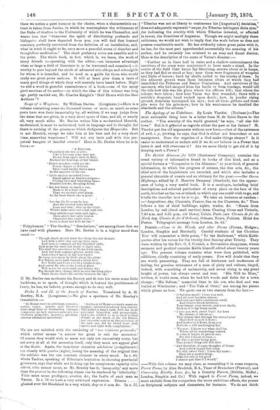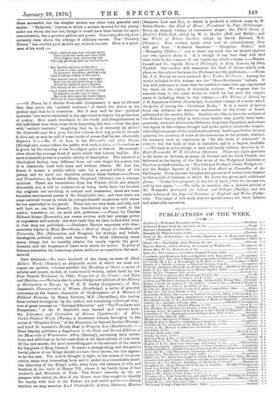Porritv.—Come to the Woods, and other Poems (Frome, Hodges London,
Simpkin and Marshall). Careful students of the Christian Year will remember a little poem, "To the Redbreast," which Kettle quotes after his verses for the twenty-first Sunday after Trinity. They were written by the Rev. G. I. Cornish, a Devonshire clergyman, whose sermons and poetical remains Kettle himself edited about twenty years ago. The present volume contains what were then published, with additions, chiefly consisting of early poems. Few will doubt that they are worth preserving. They are full of freshness and tenderness of feeling, the genuine utterances of a man of piety and culture, tinged, indeed, with something of melancholy, and never rising to any great height of power, but always sweet and true. "His Will be Mine," written, it would seem, when he had left woods and fields for a town. charge; "His Saltem," memorial lines to his son, who died and was. buried at Winchester ; and "The Vale of Otter," are among the pieces which please us best. We quote one or two stanzas from the last :— " 0 Saraton knoll I I love you well,
And all your beechen skreen; And yon east hill's continuous swell, And Otter's brook between; Your breeze, your waters, and your shade, Such as it is my being made.
I love you well, sweet Vale! for here My stream of life arose; That stream that through the eternal year Shall How as now it flows; And howscier it flows, from you Borrows a still unchanging hue.
"Tis true; I know not what shall be, When, all its wanderings ceased,
It joins at length its parent sea; But this I know at least,— He who a proper being gave, That proper being still will save.
"And therefore, if some thoughts of blame And sorrow round thee cling, Yet still, sweet Vale! I love thy name ; Thou art a sacred thing; Alike for evil or for good
I cannot quit thee if I would."
—With this volume we may class, as resembling it in some respects, Forest Poems, by Alan Brodrick, BA., Vicar of Bramshaw (Provcst), and Concerning Earthly Love, 4-c., by a Country Parson, (Dublin, Moffat ; London, Simpkin and Co.) With regard to Forest Poems, indeed, we must exclude from the comparison the more ambitious efforts, the poems on Scriptural subjects and characters, for instance. We do not think these successful, but the simpler strains are often very graceful and tender. " Heimweh," stanzas in which a mother mourns for the young sailor son whom she has lost, though it would have been better for more concentration, has a genuine pathos and power. Concerning Earthly Love certainly rises above the average of ordinary verses. The "Country Parson" has studied good models not without success. Here is a speci- men of his work :— " God's plans in spacious circuits move That touch the earth and then fulfil Their higher way, advancing still Through growing ages on toward Love.
But the full ripeness of the race Is slow to come, and God is strong In patience, watching, waiting long, And working calmly in His place.
"The marble statue, rudely wrought, Must yet be laboured many a day Before its finished grace display The beauty of the sculptor's thought.
"And slowly does God's likeness break In features on the soul of man; But God, who once the work began, Will yet its true completeness make."
—Of Poems, by J. Hector Conrcelle (Lougmans), it may be allowed that they prove the "poetical instincts" of which the writer in his
preface says that he is conscious. But it may well be that "poetical instincts" are better exercised in the appreciation than in the production of poetry. How much weariness to the world and disappointment to
the individual does there come from forgetting this fact,—from the man with "artistic instincts" imagining that he is of necessity an artist? Mr. Courcelle may be a poet, but this volume doss not prove it, though it does not, as may be said of some books of verses that we see, absolutely disprove it.--Mr. F. G. Leo, in his Petronilla and other Poems (Rivingtons), comes before the public with such a claim to digtinction as is given by the winning of the Newdigato prize at Oxford. He scarcely rises above the average level of merit which that honour implies. His most noticeable power is a certain felicity of description. The colour of a theological feeling very different from our own tinges his poems, but it is commonly used with taste and without offence. Mr. Lee has found, it seems, a public which calls for a second edition of his poems, and we need not therefore criticize them further.—Poems and Translations, by Richard Herne Shepherd (Hotten), are a strange mixture. There are translations from the French which are simply detestable, not, it will be understood, as being badly done, but because the originals are revolting in subject and treatment; there are some harmless sentimental poems of Mr. Shepherd's own ; and then there are some satirical verses in which he avenges himself on persons with whom he has quarrelled in his parish. These last are very weak and silly, and will hurt no one but himself ; the translations are no credit to the author, translator, or, we must add, publisher.—Poems, by Charles Edward Stuart (Bosworth), are verses written with fair average power 'of expression and melody ; the chief fault that we have to find with them as that they are published.—Professor Blackie expresses with char- acteristic vigour in Musa Burschicosa, a Book of Songs for Students and University Men (Edmonston and Douglas), his feelings and beliefs, theological, political, social, and literary. We think differently about many things, but wo heartily admire the manly vigour, the good- humour, and the largeness of heart with which he writes. In point of literary execution the humorous pieces strike us as superior to the senti- mental.



































 Previous page
Previous page